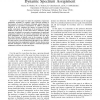Free Online Productivity Tools
i2Speak
i2Symbol
i2OCR
iTex2Img
iWeb2Print
iWeb2Shot
i2Type
iPdf2Split
iPdf2Merge
i2Bopomofo
i2Arabic
i2Style
i2Image
i2PDF
iLatex2Rtf
Sci2ools
103
click to vote
GLOBECOM
2008
IEEE
2008
IEEE
Impact of Constraints on the Complexity of Dynamic Spectrum Assignment
— In this paper we study the complexity of spectrum assignment problems in cognitive radio networks (CRNs) in the presence of several constraints. Although optimal spectrum assignment for secondary transmissions in CRNs is generally believed to be NP complete, the impact of fairness and link quality constraints on the hardness of the problem is not well studied. In this paper we show that when a minimum quality constraint is imposed on secondary transmissions, the spectrum assignment problem can be solved in polynomial time. However, such assignments may not guarantee fairness. We also show that when fairness is desired, even in the presence of quality constraints spectrum assignment problems remain NP complete. We then propose a tree pruning based algorithm to solve distance constrained spectrum assignment problem. We also discuss some heuristic techniques to solve fair distance constrained spectrum assignment problems in polynomial time.
GLOBECOM 2008 | Quality Constraints | Spectrum Assignment | Spectrum Assignment Problems | Telecommunications |
Related Content
| Added | 29 May 2010 |
| Updated | 29 May 2010 |
| Type | Conference |
| Year | 2008 |
| Where | GLOBECOM |
| Authors | Chetan Nanjunda Mathur, Mohamed A. Haleem, Rajarathnam Chandramouli, K. P. Subbalakshmi |
Comments (0)

